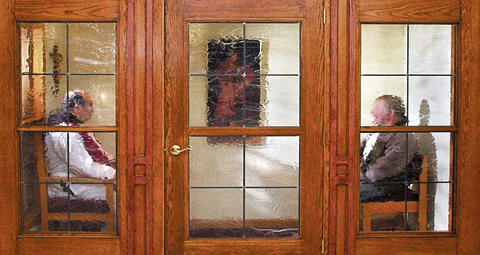March 7 | ![]() 0 COMMENTS
0 COMMENTS ![]() print
print

Strong in Faith – A weekly discussion chaired by young Catholics
DISCUSSION: Is Confession a positive or negative experience for you?
Have your say on this and upcoming topics at http://www.facebook.com/scostronginfaith
GERALD BONNER: It is difficult to describe how great a gift Confession is: A direct, personal encounter with the healing Mercy of Jesus.
Sometimes we experience an emotional high after Confession and sometimes we don’t, but the underlying reality is always the same.
Perhaps the hymn says it best: “How great the tale that there should be, in God’s Son’s heart a place for me; That on a sinner’s lips like mine, the Cross of Jesus Christ should shine.” And also, to be perfectly frank, everything in life is better in the state of grace!
Of all the tragedies in our particular age, surely one of the greatest is that so many Catholics stay away from Confession and don’t realise the superabundance of graces freely offered there by Our Lord through His priests.
HANNAH HARTLEY: Confession—the actual process and beforehand—is difficult, but it is the greatest feeling afterwards knowing all your sins are forgiven.
n Have your say on this and upcoming topics at http://www.facebook.com/scostronginfaith
The incredible gift of reconciliation with God
By Aidan Michael Cook
If Confession were simply the act of accusing ourselves of sins, then for most of us it would, of course, be an entirely very negative experience. We tend not to like admitting faults, and certainly not
having to reveal them to someone else.
Confession (right), however, is of course about much more than that. The confession of sins is not in itself the goal but rather the means to attain forgiveness and Sacramental grace, and to help us amend our ways. It is part of that great process of conversion of life, which is especially on our minds during Lent.
The works of Sacramental Penance or satisfaction can also be seen as a negative experience but actually help to free us. As the Council of Trent stated: “When we suffer for our sins by making satisfaction, we are made conformable to Christ Jesus who satisfied for our sins,” and we receive ‘a most certain pledge, that if we suffer with Him, we shall also be glorified with Him.’
A well-known exorcist was being interviewed and had to remind the interviewer that while exorcism has the drama and intrigue, it is Confession that is the greater weapon in the struggle against evil. At the heart of Confession is the power to absolve sins, granted by Christ to His Church: in this great sacrament we can all approach Christ and have Him say, ‘your sins are forgiven you. Go, and sin no more.’
Facing up to our sins is not —and is not meant to be—a nice experience. Indeed, at one level Confession is necessarily a negative experience as to be effective the Sacrament requires true sorrow for our sins. But the great good that can come from this is one of the most positive experiences there is: to be absolved of our sins, to have the burden of our faults lifted and be freed to grow in Faith and love. To be lifted up, in other words, to friendship with God.
Not only that, but Sacramental Confession is a channel of the divine grace we need to help us to overcome our faults. We fight daily against the effects of original sin: human nature is fallen and requires God’s grace in order to be raised up. So Confession not only brings forgiveness for our sins, but also helps us in our resolve not to sin again. This is especially true of the practice of frequent Confession.
The Sacrament of Reconciliation helps us to follow St Paul’s exhortation to the Ephesians: “Put off your old nature which belongs to your former manner of life and is corrupt through deceitful lusts, and be renewed in the spirit of your minds, and put on the new nature, created after the likeness of God in true righteousness and holiness.”
It can be painful, humbling and even humiliating, but it is a small price to pay for the incredible gift of reconciliation with God.











